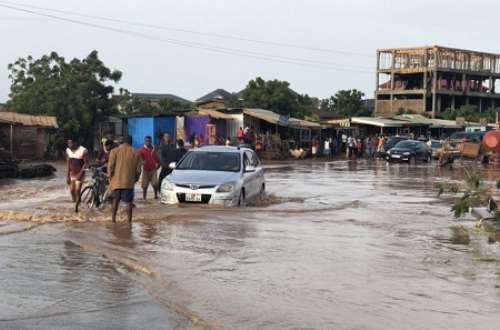- by arkoh
- March 8, 2024
Click the link below to join Our WhatsApp group for daily brief on current trends in the country.
Join Here!
Loading

In a recent turn of events, heavy rains in Accra have resulted in severe flooding and property damage, sparking concerns among Ghanaians.
Social media has been overwhelmed with photos and videos of the flooding under the hashtag #Accrafloods, drawing attention to the pressing issue.
The World Bank has released a report indicating that urban floods in Accra have become more frequent and intense due to factors such as rapid development in flood-prone areas, inadequate drainage systems, and the accumulation of solid waste along waterways.
This alarming trend has reignited calls for the government to enhance flood management measures, especially as public outrage over the flooding coincided with recent demonstrations at Jubilee House.
However, the government in May this year secured $150 million in additional financing from the World Bank which is dedicated to the Greater Accra Resilient and Integrated Development Project (GARID),
GARID aims to improve flood risk management and solid waste management for over 2.5 million people in the Odaw River Basin of the Greater Accra Region.
GARID's comprehensive approach includes the establishment of an early warning system and the enhancement of drainage infrastructure in low-income communities within the Greater Accra region.
The GARID project is just one component of the broader National Flood Control Programme (NFCP), designed to address the perennial flooding issue and bolster the country's resilience to climate change.
The Minister for Works and Housing, Mr Francis Asenso-Boakye, affirmed that the ministry has initiated processes to implement both the 2022 NFCP program and the GARID Project.
“These projects will have an overall objective of mitigating flood risk as well addressing the challenges associated with solid waste management,” he said.
The Greater Accra region is a cornerstone of Ghana's non-oil GDP, contributing a substantial 40% to the nation's economic output. The threat of flood damage to this vital economic hub has raised concerns about its potential impact on Ghana's development.
In collaboration with international institutions such as the World Bank, Ghana's Ministry for Works and Housing is committed to implementing sustainable development practices outlined in the United Nations Sustainable Development Goals (SDGs).
As the government takes action to prioritize the mitigation of environmental disasters in the Greater Accra region, it becomes evident that these efforts are not only for the nation's prosperity but also for the well-being of its people.

Click the link below to join Our WhatsApp group for daily brief on current trends in the country.
Join Here!
0 Comments: